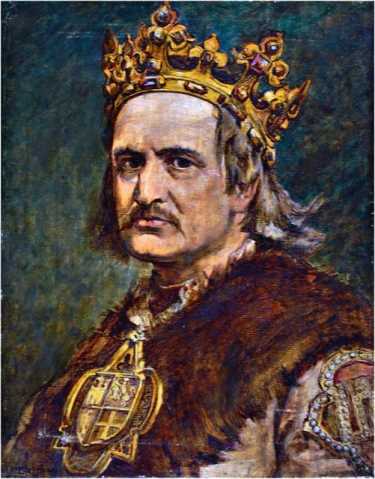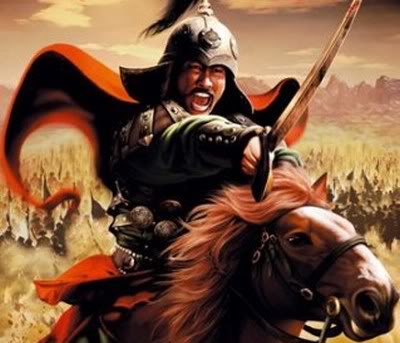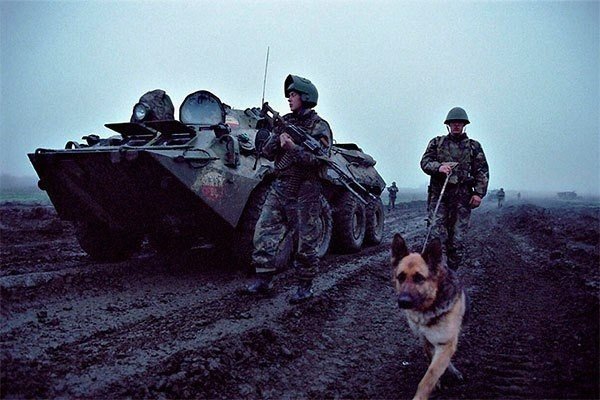
Vladislav Jagiello
Lithuania and Poland at the time the rules cousin Vytautas King Jagiello, married in 1385 year on the Polish Queen Jadwiga. Vytautas was a vassal of King Jagiello - his cousin, ruled the Lithuanian on his behalf. A condition of entry to the Polish throne of Jagiello was baptized Lithuania, and in the reign of this king most of Lithuanian pagans accepted Catholicism. Lithuania became a Catholic country with churches and Latin script - although residents of Russian regions of the Duchy remained faithful to Orthodoxy. Enjoyed the support of Poland and the Order overlord Moscow, Tver and Ryazan principalities Vytautas was a powerful ruler. He gathered a huge army from Lithuania, Rusi, Poles, Moldovans; Master of the Order gave him a large force of knights and bombards. As part of Vytautas troops fought princes of the unit of the Grand Duchy of Lithuania and Russian, in particular: Andrei of Polotsk Polotsk, Dmitry Olgerdovich Bryansk, Dmitry Mikhailovich Bobrok Volynskyy, Ivan B. Kiev, Gleb Svyatoslavich Smolensk and Dmitri Danilovich Ostrog, - as claimed by Nikon Chronicle, Golden Horde opposed to "fifty-Slavic princes of squads". Besides, Vytautas was in the army with his troops Alexander Mansurovich mom and Tokhtamysh, shortly before it devoid of Khan's throne in the Horde, as well as the Knights of the Teutonic Order. Tokhtamysh disposal detachment of several thousand Tatars.
AT 1398 godu Khan Tokhtamysh, who fought for the unification of the Golden Horde under his sole authority, faced with a strong and dangerous opponent - Khan Timur Qutlugh. Tokhtamysh, defeated in the struggle with Timur Qutlugh, He fled with his family to Vytautas in Kiev. Vytautas represented Tokhtamysh seen an instrument of its expansionist policy, by which he wanted to subdue the Golden Horde to their political influence (previous action, in particular, trips 1397 and 1398 years have been successful, but did not bring any political benefit to the Grand Duke). The Nikon Chronicle contains literary words processed Vytautas, vividly describing Lithuania's plans: "Come pleniti land Tatarskuyu, Boss Temiry Kutlu, take his kingdom and divide his wealth and possessions, and put him in the Horde in the realm of his king Tokhtamysh, and Coffee, and ended up, and on the Crimea and Aztara-Kani, and Zayaitskoy Horde, and all Primorye, and Kazan; and that is all ours and our king ".

Han Zolotoi Ordy Tokhtamysh
In response to the demands of Timur Khan Kutlug give him Tokhtamysh Vytautas refused. Furthermore, Prince Khan threatened a new campaign, which is quite consistent with the intentions of the Grand Duke. Vytautas, gathered troops, He marched in 1399 He was camped on the river Vorskla. Timur Qutlugh feared large and well equipped with a Lithuanian army and went to the peace talks. The subsequent course of events was interrupted by the arrival of the troops of the Emir Edigei, who persuaded Kutlug Timur break talks with Vytautas and prepare for battle. Vytautas united army began to gather in the spring of Kiev 1399 of the year. She came from Kiev 8 of August and a few days later went to the Vorskla River - a place of the future battlefield, there also came the Tatar army. Han, seeing the power and the large number of Lithuanian troops, Getting started peace talks, but Vytautas make demands as the winner. Came up with his army of Emir Yedigei protested the negotiations and refused all conditions Vytautas. The battle began 12 August. Lithuanian army began crossing the river, Tatars met them a frontal assault, and part of the cavalry struck the flank, and Lithuanian army could not resist. Despite the large number of Lithuanian army and its good equipment (including the presence of artillery, the application of which was ineffective against moving riders, and arquebuses and crossbows), Army Vytautas bыla utterly razbyta. Horde of Vytautas pursued the remnants of the troops to the Kiev. The chronicle contains the following description of the final stage of the battle: "And thus Tatariv vzyashe carts and carts kovanyya utverzhennyya with Chapman iron, and cannon and arquebuses and crossbows, and much wealth and great, golden and silver vessels poyamasha ". Most of the generals were killed, Vytautas himself was wounded and barely escaped. Tokhtamysh, as well as German allies fled from the battlefield. In pursuit of the retreating enemy, Edigei Tatars devastated Kiev and Lithuanian lands. Kiev huge ransom price (3000 rubles) It managed to pay off the Tatar attack, threatened him with ruin. "Khan went to the steppes, leaving Lithuanian lands in mourning and scarcity ", He wrote the great Russian historian C.. M. Solovyov. The defeat of the Vorskla River determined the future course of history in Eastern Europe, worsened the foreign policy positions of Lithuania because of the inability to resist the military forces of neighboring states, Vytautas meant the collapse of the claims for the role of unifier of the East Slavic lands. As a result of the battle Tokhtamysh largely lost its former political influence and subsequently was not able to compete with its rivals in the struggle for the throne of the Golden Horde. Battle of the Vorskla River, on the assumption of a number of historians, krupneyschey was a battle of the European Middle Ages and the attempt to unite the Western and Eastern Russia Vytautas.Gabriel Tsobehiya











